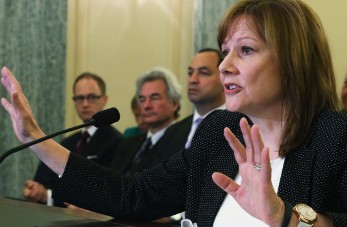Last January General Motors new president Mary Barra released a statement of values entitled, Winning with Integrity, Our Values and Guidelines for Employee Conduct. In the introduction, Barra writes, “During the last few years, we have aggressively pursued a competitive advantage in every aspect of our business. You can see this reflected in our new products, our acquisitions and alliances, our balance sheet strategy and the billions of dollars we are investing in plants, equipment and technology.”

She then adds, “I also believe our culture can become a competitive advantage, and that includes earning a global reputation for honesty and integrity in all of our activities.”
Earlier this month, GM fired 15 individuals linked to the recall scandal which took over 10 years to address a faulty ignition switch in Chevrolet Cobalt’s that claimed 13 lives.
“Some were removed because of what we consider misconduct or incompetence,” Barra said. “Others have been relieved because they simply didn’t do enough: They didn’t take responsibility; didn’t act with any sense of urgency.”
However, TIME magazine writes (June 5), “An internal GM report found no deliberate cover up and said the top management did not know about the defect until the recall.”
What part did GM’s focus on “competitive advantage” play in a scandal that has recalled 2.6 million cars for defective ignition switch problems, and led to the recall of another 11 million regarding various other issues? How much focus was placed on meeting goals and deadlines at the expense of their reputation for integrity?
A recent New York Times story (Apr. 5), to a look at the scandal in terms of holding executives accountable by utilizingclawbacks – money or benefits taken back due to failures that could have been avoided.
“Who decided, and who agreed, that 90 cents was too much to pay for each switch that would have apparently fixed the problem that has been linked to 13 deaths?” the Times asks. “How much did that decision add to the company’s bottom line and contribute to its executives’ compensation over the years? What will the company have to pay in possible regulatory penalties and legal settlements? …
“While shareholders of GM will shoulder the costs of fines, settlements and the loss of trust arising from the mess, the executives responsible for monitoring internal risks like these are unlikely to be held to account by returning past pay.
“That’s because GM’s compensation policies, like a vast majority of those across corporate America, require recovery of bonuses in only a few circumstances, mostly related to accounting. They do not require recovery when executives take shortcuts or engage in other types of unethical behavior that imperils customers and the company itself.” …
“Some large shareholders have been working to expand these so-called clawback provisions. Disturbed by companies engaging in improprieties and leaving their shareholders with the bill for the ensuing legal settlements and regulatory fines, these activist investors are trying to put strong recovery policies in place. The goal is to make sure that insiders who engage in questionable conduct are required to pay the piper — and that the companies let shareholders know they have done so.
“Scott M. Stringer, the New York City comptroller, is one of these investors. As overseer of five municipal employee pension funds with assets of $140 billion, Mr. Stringer and his staff have successfully negotiated expanded thresholds for clawbacks at four companies this year: Allergan, Halliburton, Northrop Grumman and United Technologies. The companies were chosen because they are in heavily regulated industries and were subject to large regulatory settlements in recent years.
“Under the agreements with the four companies, pay can be retrieved from a wider array of senior executives than is typical. And recoveries can be sought not only for intentional misconduct and gross negligence, but also for violations of law or company policies that cause significant financial or reputational harm to the institution.
“It is pretty clear that clawback policies need tightening at many companies. A 2012 article in “The Corporate Board” by Jesse Fried, a professor at Harvard Law School, and Nitzan Shilon, then a doctoral candidate in juridical science, found that just over half of 485 companies in the Standard & Poor’s 500-stock index had any clawback provisions as of mid-2010.
“The authors also concluded that of those, 81 percent gave boards discretion to let an executive keep excess pay even if the board found that the executive had committed misconduct.
“Mr. Stringer and his colleagues say it’s time to change that leniency. In their negotiations with companies, they argued that it might be appropriate to hold senior executives accountable if they failed in their oversight of others.”
It is still not known which GM executives knew of the ignition switch issue and ignored fixing the problem. In Barra’s Winning with Integrity, the new GM president discusses how to act with integrity when the rules seem unclear:
“Not all situations are clear-cut, so good judgment is essential. Be alert to warning signs: if a questionable proposal is defended as ‘doing whatever it takes’ or because ‘our competition does it’ or ‘no one will ever know,’ chances are it needs to be reconsidered.
When in doubt about the right choice, ask yourself:
Is it legal?
Is it consistent with our values and policies?
Would you be willing to be accountable for your actions?”
All good stuff, but without constant monitoring, active discussions with employees and executives with actual examples, it all becomes meaningless in a culture that stresses “competitive advantage.”
“Quite simply,” Barra writes, “more suppliers and customers will want to do business with a partner they can trust implicitly.”
And she’s right. However, what Barra and her executives need to make consistently clear is a commitment to maintaining that trust even at the cost of any and all necessary repairs.
Trust pays far more dividends in the long run than willful blindness.
Comments










